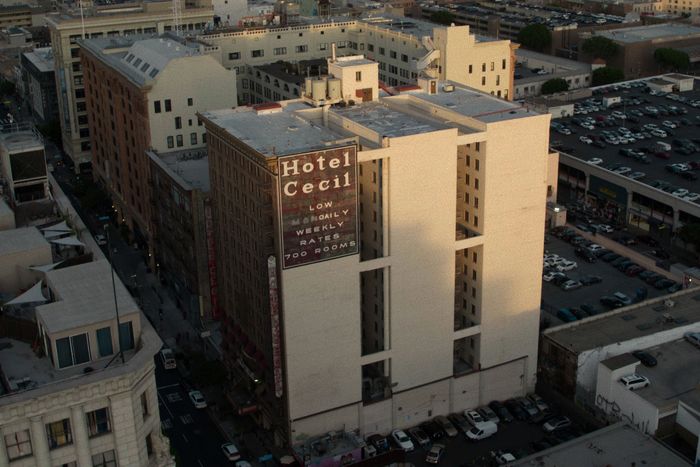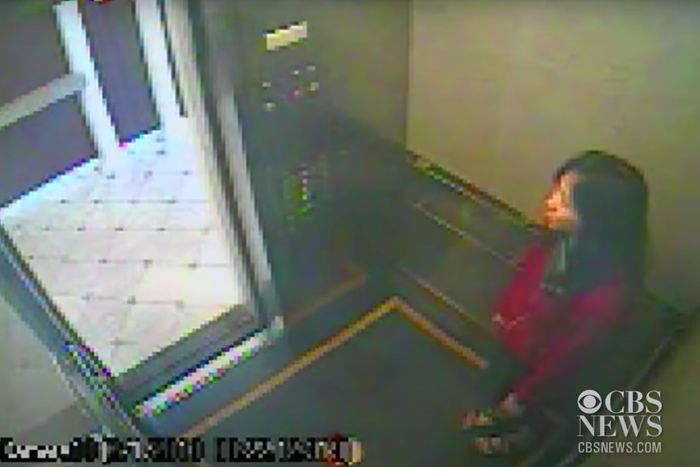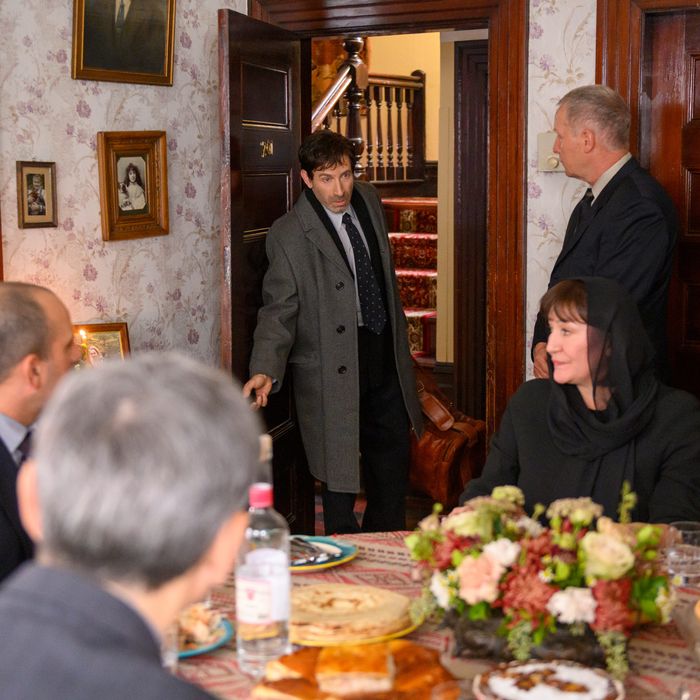from Curbed.com
https://www.curbed.com/2021/02/the-cecil-hotel-elisa-lam-netflix.html
Crime Scene:
The Vanishing at the Cecil Hotel
FEB. 24, 2021
The Cecil Hotel Docuseries Is a Crime Story in Search of a Crime
By Willy Blackmore

Photo: Netflix
Spoiler alert: Major plot details revealed within.
It’s one of the more indelible and eerie moments in internet video history: A girl in a red hoodie walks into an empty elevator and presses the buttons for more than a handful of floors. She then begins to peer up and down the hallway, stepping in and out of the door (and out of the security-camera frame), as if she’s waiting for — or trying to avoid — someone. She hides in the corner for a time, and her movements become more odd and exaggerated. Nothing dramatic happens, but there’s a shiver-inducing sense that something is wrong. The video, released by LAPD in 2013, is the last known sighting of Elisa Lam, a 21-year-old Canadian tourist who disappeared while she was staying at the Cecil Hotel in downtown Los Angeles. Nineteen days after she was recorded in the elevator, her body was found in one of the water tanks on the roof. The last, unnerving glimpse of Lam in the elevator went viral and it has sparked a wild online afterlife, a season of American Horror Story, and now a new Netflix docuseries that puts her life and death, and that of the infamous Cecil Hotel, into the ever-popular true-crime format — which is a troubling approach to take for a story in which it is increasingly clear that no crime ever took place.
There is one thing you should know before watching the Netflix docuseries Crime Scene: The Vanishing at the Cecil Hotel — but it isn’t revealed until the fourth and final episode. So consider this both a spoiler alert and a giant asterisk to place next to the first three episodes: When Lam’s body was found in a water tank on the Cecil’s rooftop, the access hatch on top of the tank was open, not closed as the police initially reported. Despite the video, Lam appears to have either fallen or jumped into the tank and drowned. This detail, which was gleaned from a 2015 lawsuit Lam’s family brought against the downtown Los Angeles hotel and corroborated in an interview with the former employee who found her, pretty effectively eliminates years’ worth of conspiracies about the mysterious circumstances surrounding the death of the 21-year-old Canadian tourist. Although her body was naked when she was found, it showed no signs of trauma, and the only major red flags in her toxicology report were the prescription medications she took for bipolar disorder and depression that were not present in her blood. The fact about the hatch, and the timing of its revelation, presents a serious problem for the series: How is there a “Crime Scene” if there never was a crime?

Even before it became an online sensation, the story was followed breathlessly by Los Angeles cable news in 2013. It was the kind of horrific noir tale that always felt like an echo of some other rainy, black-and-white Los Angeles playing out in real time in the drought-stricken modern city. But in many ways, Lam’s story has proven to be an anomaly for the Cecil, which has been infamous for nearly all of its 94 years: She appears to have only died at the hotel rather than somehow because of it. Even before Richard Ramirez lived there during his Night Stalker killing spree in the 1980s, there were stories: the woman who jumped from the ninth floor and flattened a man on the sidewalk below; the Elizabeth Short sighting there shortly before she was cut in two and became forever known as the Black Dahlia, victim of L.A.’s most notoriously unsolved murder. In the 1970s, Los Angeles tried to confine homeless people to nearby Skid Row, and the Cecil became a kind of quasi-shelter like many of the formerly grand hotels along Main Street — and the site of the kind of crime that generates fear rather than sympathetic victims. According to Amy Price, who was the Cecil’s manager when Lam checked in, there were some 80 deaths — ranging from overdoses to suicides to killings — at the hotel during the decade she worked there.
But despite having nine years of hindsight and clear sense on what likely did happen — that Lam went off her meds, and that if she was indeed running from anything it was in her own head — the filmmakers cede the narrative to a bunch of cops and a number of “web sleuths” who have spent years developing Elisa Lam conspiracy theories.
The series entertains various theories of what might have happened to Lam — that she was killed by another Cecil guest, that she was the victim of a copycat killing inspired by the 2005 horror flick Dark Water, that she was an op involved in an international conspiracy to spread a new strain of tuberculosis. Not only are these conspiracies detailed, but choice bits are pulled from Lam’s own Tumblr to make each potential horrific thing that absolutely did not happen to her seem plausible (although not for the whole TB thing, a subject she apparently never blogged about). The show works something like this: A narrator reads from her blog about how she was open to meeting a guy on her trip to California, and then there’s a whole section about how perhaps she was picked up by someone and then killed. Or we hear how she blogged that “my mouth is my downfall, and it will get me in trouble,” and then that horrific possible outcome is explored. “Anybody’s vulnerable, especially if you’re a naïve girl from some other country who’s here who’s thinking it’s all beaches and roses — it’s misleading,” says one of the LAPD cops. We hear about the pervasive crime on Skid Row, about how she couldn’t have possibly walked out the door without being offered hard drugs (in ten years of living in L.A., I was never offered hard drugs on or around Main Street), about the homeless men and the guys fresh out of prison who were surely riding up and down the same elevators. Surely something about the hotel must have figured into her death?
Some of the would-be killers the internet latched on to get more screen time than others, including Morbid, a black-metal musician (real name: Pablo Vergara) who had previously stayed at the Cecil and used to record songs that explored, well, morbid fantasies, including chasing down and killing a woman. With his tendency toward white contact lenses, facial piercings, and stage blood, Vergara may not look like the most sympathetic character, and he did make a video proclaiming his innocence in full Morbid dress and style that is more creepy than convincing — but the fact remains that there is nothing at all tying him to Lam. That didn’t stop sleuths convinced that he had killed Lam from stalking Vergara online, and the cyberbullying campaign mounted against him led Vergara to a suicide attempt.
“I do feel like I’ve lost my freedom of expression,” Vergara said in an interview for the docuseries. “I actually haven’t made any more music. When I try, it’s not the same. I’m trying to rebuild my life and everything, but it sucks. Every day, it’s never going away. I have to live with it for the rest of my life.”
It’s a shame, really, because you can so easily imagine a documentary that handles the facts differently and is more suspicious of the web sleuths and YouTubers who have been “investigating” the case for the better part of a decade. At a time when conspiracy theories have had an outsize influence in politics and public health after festering for years in closed communities (offline and on), why not start right off by saying that there was no crime, and instead look at Elisa Lam as the person she was? And then, separately, consider the community that has kept some horror-movie version of her alive online more critically.
There’s a quote from Lam’s Tumblr that figures in the first episode of Crime Scene, “the internet doesn’t really have consequences,” that I keep coming back to. While it may have rung true when she was still alive and writing in the early 2010s, we have again and again seen how it is decidedly not the case — QAnon and anti-vaxx conspiracies being prime examples. But instead of taking that shift in our understanding of online communities and conspiracies as its subject, Crime Scene: The Vanishing at the Cecil Hotel only touches on the consequences of the internet, and the stories that take on a life of their own there, in the lightest of ways.









